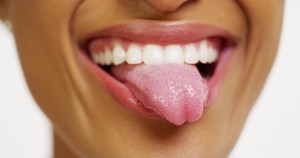 Normally when you think of oral hygiene, you think about taking care of your teeth and gums. However, as WebMD explains, your tongue is an extremely important part of your body. It allows us to taste foods, chew and swallow them, and it helps us to speak. When healthy, the tongue is pink, covered in small nodules that are called papillae. In between the papillae are your taste buds. Because the tongue is so crucial, and because you’re using it all day long, when it develops a problem, it can be very uncomfortable. Tongue problems can include pain and discoloration, but fortunately, most of the common tongue symptoms aren’t serious and they might even go away on their own.
Normally when you think of oral hygiene, you think about taking care of your teeth and gums. However, as WebMD explains, your tongue is an extremely important part of your body. It allows us to taste foods, chew and swallow them, and it helps us to speak. When healthy, the tongue is pink, covered in small nodules that are called papillae. In between the papillae are your taste buds. Because the tongue is so crucial, and because you’re using it all day long, when it develops a problem, it can be very uncomfortable. Tongue problems can include pain and discoloration, but fortunately, most of the common tongue symptoms aren’t serious and they might even go away on their own.
Here are 5 common tongue problems, their possible causes and typical treatments.
- White Coating on Tongue – There are several conditions that can cause patches of white areas to appear, including oral thrush, oral lichen planus and leukoplakia. Oral thrush, otherwise known as candidiasis (candida), is a common yeast infection that, inside your mouth, can resemble cottage cheese on your tongue. This is very common for infants and elderly people, in addition to those with weakened immune systems. Others who are susceptible include diabetes sufferers and people who take inhaled steroids for lung disease or asthma. Oral thrush can also occur after taking antibiotics, which can also attack the healthy bacteria that lives in your mouth. Therefore, one treatment is to eat plain yogurt with active cultures or take a probiotic supplement to restore your mouth’s natural flora. Your doctor might also prescribe medications to fight the infection.
- Redness on Tongue – There are several factors that may cause this, and in certain cases, your tongue might even begin to look like a strawberry, since taste buds can turn red and become enlarged. A deficiency in vitamin B12 and folic acid may be the culprit. If this condition is accompanied by a high fever, it may be scarlet fever. If you have a red tongue and a high fever, see your doctor immediately! You might also have a geographic tongue, which is so-named because it looks like a map of red spots. This is likely harmless, but see your dentist if they last for more than 2 weeks. No treatment is necessary, but they might prescribe a topical medication to relieve any pain or discomfort.
- Sore or Bumpy Tongue – Many things can cause your tongue to become painful or bumpy, including accidentally biting it or burning it with hot liquid, canker sores, smoking, burning tongue syndrome (in postmenopausal women), enlarged papillae or some medical conditions like anemia or diabetes. In rarer instances, it could be a sign of oral cancer, so you should always see a doctor if it doesn’t go away in 1 to 2 weeks.
- Tongue Swelling – The New York Times health guide mentions other common tongue problems, including tongue swelling. This can occur with various hormonal conditions and medical disorders, but it can also be an allergic reaction or a side effect of certain medications. An enlarged tongue might also be due to a strep infection, so if you have a swollen tongue, it is wise to alert your doctor.
- Taste Problems – Your tongue can sense salty, sweet, sour and bitter tastes, and sometimes, you might experience a loss of taste. This will frequently happen if you are sick and are suffering from some type of infection. Other causes can include damage to the taste buds, nerve problems or a medicine’s side effect. If this persists for longer than a week, consult your doctor.







Leave a Reply